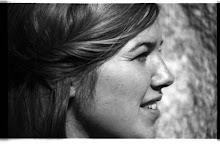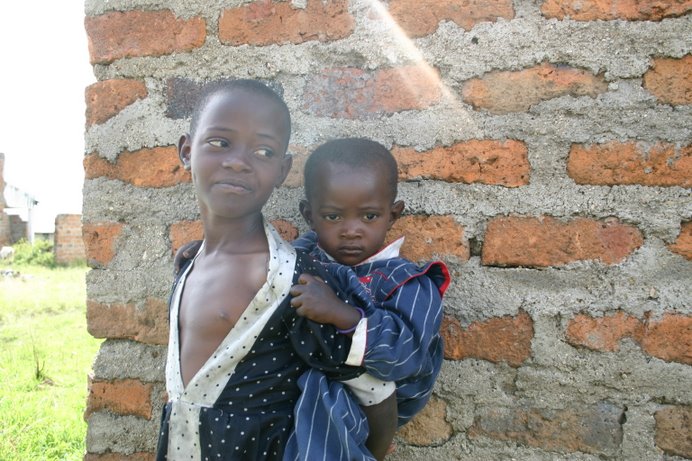Many Kenyan women I know are very much like the Proverbs 31 Woman. They consider fields, they rise before dawn to care and prepare for their families, they save for the servant girls, give to the poor, they’re good money managers, business women…Their children call them blessed and so do their husbands. Their arms are strong for their task and so is their neck.
Life in Bible times is much more accessible to my mind and more palatable to my understanding since tasting Kenya. In Kenya, you don’t need to weasel your way into this passage and spend time thinking about how it translates into your life. A Kenyan woman often considers fields, and when it belongs to her family, she digs and digs. She prepares the shamba with rhythmic, forceful swings of the jembe. She raises it above her head and releases it down with a noise that resonates out of the ground and changes depending upon the last rain. Black cotton soil cracks in the sun and makes short, struggling chlink chlink sounds as the metal edge picks its way through. The sound of wet soil is more of a shlink, shlurp, suctioning sound. The wet soil is like a hostess who quickly and warmly welcomes you in, but then clings to you, hanging as you make your way to the door, not wanting you to leave.
Many families have house girls who are usually a younger relative like a niece or a cousin or a sister who want a change of pace from their home or need a sure meal and a place to sleep. They take girls, and often treat them like daughters in a way.
“Her husband has full confidence in her and lacks nothing of value. She brings him good, not harm, all the days of her life.” This makes me think of David and Meshack, the two fathers on the farm, and how they love and trust their wives, Anne and Susan. They adore them and respect them and are always being thoughtful towards them. The word “confidence” is the perfect word to describe their stance toward their wives. They make decisions together a lot more than other couples that I see in the area and they also like doing things together. I am delighted when I hear things like this: David says, “ Oh, let me just pull over here and buy some tomatoes for Anne, she will be so happy.” Meshack says, “You won’t mind, what I am gonna do, is to stop and pick up some bananas because my wife loves to eat bananas.”
“She sees that her trading is profitable, and her lamp does not go out at night.”
I think of Anne Isuvi measuring their milk out to people who come to her kitchen to buy. I think of Rosalyn and Juliet who have little shops in their homes where they sell the essentials: soap, Roico seasoning, little yellow balls of cooking fat wrapped in plastic, sugar, salt and matchboxes and kerosene. I see Rosalyn’s head balancing a load of firewood, which she traded by giving an old Mama some beans to plant. Her trading is profitable; she knows what her family needs and what she has to give. They trade buckets of maize for a day’s labor of weeding in the field and trade vegetables for vegetables.
“She opens her hands to the poor and extends her hands to the needy.” I see Rosalyn wrap up a hot chapatti in a torn corner of the flour sack and send it home with the lady whose house burned down last year. I see her piling mounds of popped corn, hot off the fire, into the cupped hands of the little raggedy boys sent to her to fetch their family’s milk for chai. They sit on stools and stuff the popped corn into their mouths with both hands held close to their face for easy access. Their teeth and the whites of their eyes match the popped corn and they all work in unison to fully satisfy Rosalyn’s generosity.
Sizco sits shredding greens for Anne and the next minute is helping Kimae prepare chapattis for the apprentices to bring for the potluck. Nancy is bending thoughtfully over Lucas’ math problem, explaining his confusion away. Anyone who comes to chat while you’re in the middle of something, will automatically take up the task with you and talk for a bit. Kenyan women actually do get up while it is still dark and rarely eat the bread of idleness. Susan does make garments and sell them, and the women I know watch over the affairs of their household with a care and dedication that leaves little time for the distractions of luxury.
Nehemiah families begin to have a higher propensity to honor instead of blindly expect the dedicated labor and noble character of the woman of the house. “Her children arise and call her blessed; her husband also, and he praises her: Many women do noble things, but you surpass them all. Charm is deceptive and beauty is fleeting, but a woman who fears the Lord is to be praised.”
Monday, October 25, 2010
Saturday Celebration
Saturday October 23, 2010
(A graduation party for Josphat, our children’s department head)
David, in his playfully formal manner, stands up to welcome us and give a sort of agenda for our gathering. He says something to the effect of, “I think we all know why we are here; because Josphat has invited us to celebrate with him. He has done a noble thing in graduating with high honors and we are all very proud of him. First I’ll ask for a prayer, then we will sing a song, and eat…we have plenty of food. After that we will have some speeches from various guests, and from the man of the hour. Then we shall sing again and close our evening with another matter that concerns us.”
The afternoon leading up to the gathering in the church was spent busily preparing at the Isuvi house. I sat on the cement patio peeling potatoes for two hours while all around me the boys swirled in and out with pots and firewood, cabbages, chicken feathers and armfuls of tomatoes. David pops in and offers me cooked bananas and strong tea for lunch and then darts away again, gathering helpers to slaughter Josphat’s lamb. After seeing signs of the slaughter carried past, (knives, buckets of water, buckets of blood, a skinned sheep’s tail…) I finally see Ken (our lab technician) walking over with a huge grin and a bucket with protruding hooves and carved delicacies. “I am a slaughterer!” He tells me jokingly and swirls the bucket around as I peer inside. The joyous bustle culminates as all the other woman come to the kitchen to help make chapattis. I am in awe of Josphat’s generosity and ask if we should have just done it like a potluck where everyone contributes a dish. But he says no, he wanted to bless us and have a way to thank us all. And besides we were helping in the preparation anyway. I can’t but think how much this meal will set him back, but in true Josphat fashion, he thinks more of others than he does of himself.
We are all satisfied and full of rice and meat and cabbage, licking the grease off our fingers and finishing the last of our bottled sodas. The florescent light of the church is only available because of the generator, noisily groaning with the tractor outside. The power is out but our milk needs chilling and our party needs light. Voices slide away silently and our faithful M.C. rouses our attention for the speeches. “ I am just going to call upon a few people to say something about Josphat. Fidelis, you’ve been with Josphat, what can you say to him?” Fidelis stands, smiling as always, pauses with decorum and proceeds: “Good evening, we want to thank Josphat for being with us and caring for us. We love him and we need him.” The speeches went on and on, as David randomly and surprisingly gave each person present the opportunity to affirm Josphat. Anne made jokes about him as her “first born son” in a manner worthy of a mother, Jeanie encouraged him to start looking for a wife, friends told how much Joshphat had encouraged them. The boys all thanked him, and there was not one person with any thought but joy and gladness that we know and have Josphat among us.
I can’t stop smiling and even crying for how beautiful and life giving those words are to Josphat. The openness of the Kenyan heart shines like I’ve never seen this night and we aren’t waiting for a funeral to praise a person. He also stands and gives each one of us a word of gratitude and friendship. Josphat has no supportive family apart from Nehemiah, but he fears the Lord, takes advantage of opportunity in humility, and loves people, which gives him great success. He was honored with the highest position in his psychology and social work program and received many offers from organizations, but he knows he is called here for now. This family celebration is truly the first of its kind here at Nehemiah as we have never honored and appreciated one person in this formal and intimately united of a way. The overarching sentiment is that Josphat is bearing fruit. Fruit that he has shared and blessed us with.
Songs are sung and prayers are said and one last item remains. David hands the floor over to Meshack who stands and begins with reminding us of the purpose of families. He says something like this in his melodically loud and eloquent way: “ We come to share together our joys because it concerns us, and we are happy together when one of us is rejoicing but when something bad comes, we also want to share in it because it concerns us. Tonight we want to bring to the community’s attention, something disappointing. But when one of us is gone astray, we want to bring him back because we care about him. Solomon would like to give a confession.” Solomon stands in front of us, solemn and pressed. He strains to confess over the noise of the generator, but his volume is not satisfactory. Meshack translates his volume and forms such an interrogating voice that he would be more appropriate in a court room. Solomon confesses publicly, although some of us are aware, that he snuck out of the fence and slept with a girl in another house. By doing this he has broken most of our rules, namely, sneaking out, having a relationship, and dishonoring and lying to his parents. He asks for our forgiveness. The floor is opened to various people for responses. He is forgiven but not trusted, for regaining trust takes time and is up to him. Please pray for him as he is so well loved, yet rarely repentant to the point of changing his behavior or heart in other similar cases.
The mood with which we leave the church is an entirely opposite atmosphere than the way we entered. In some ways it seems odd and inappropriate to me to have both agendas smudged into one evening for the sake of convenience and timing. Yet in another light, I see the goodness and grace of being able to hold two things in our hands at once; to pair our joys and sorrows together as any family would. The foundation of love in the first half epitomized and peaked the beauty of our community which set the tone for loving discipline, although it was not facilitated perfectly, it seems right to be capable of handling opposites in such a way that reminds us who we are as a community and how in all ways, we want to help each other grow.
Subscribe to:
Posts (Atom)





